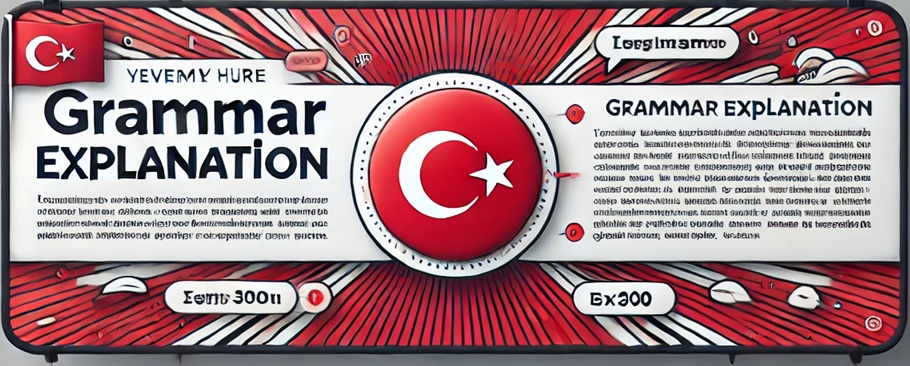Lesson1-Video
Learn New Turkish Words
Turkish series for learning Turkish
How to use ”sokmak” and ” ısırmak” verbs in Turkish?
Animal Bites/Stings in Turkish vs. English
Key Terms:
| Turkish | English Equivalent | Literal Meaning |
|---|---|---|
| Yılan ısırması | Snake bite | Snake’s biting |
| Yılan sokması | Snake sting (incorrect*) | Snake’s stinging (rare) |
| Böcek ısırması | Insect bite | Insect’s biting |
| Arı sokması | Bee sting | Bee’s stinging |
Grammar Note:
-
“Isırmak” = to bite (for animals with teeth: snakes, dogs).
-
“Sokmak” = to sting (for insects with stingers: bees, scorpions).
Animal Bites/Stings: Expanded Examples (8+)
Key Terms & Sentences
| Turkish | English | Grammar Notes |
|---|---|---|
| Yılan ısırdığında panik yapma! | Don’t panic when a snake bites! | Isırmak = bite (teeth) |
| Arı sokması şişlik yapar. | A bee sting causes swelling. | Sokmak = sting (stinger) |
| Akrep sokması ölümcül olabilir. | A scorpion sting can be deadly. | Used for venomous creatures |
| Sivrisinek ısırığı kaşıntı yapar. | Mosquito bites cause itching. | Isırık = bite mark |
| Köpek ısırmasından korkarım. | I’m afraid of dog bites. | Animal-specific verb |
| Denizanası sokması acı verir. | Jellyfish stings are painful. | Marine life uses sokmak |
| Bu bitki cilde dokununca yakar. | This plant burns when touched. | Yakmak = burn (plants) |
| Örümcek ısırığı alerji yapabilir. | Spider bites can cause allergies. | Neutral term for bugs |
Please try to answer the questions below. (Ask your students the following questions.)
Interactive Questions:
-
“Seni hiç arı soktu mu? Nerede oldu?” → “Has a bee ever stung you? Where?”
-
“Yılan gördüğünde ilk tepkin ne olurdu?” → “What’s your first reaction to seeing a snake?”
-
“En korktuğun böcek nedir?” → “Which insect scares you the most?”
-
“Alerjin var mı? Böcek ısırığına alerjik misin?” → “Do you have allergies? Are you allergic to bug bites?”
-
“Evine yılan girse ne yapardın?” → “What would you do if a snake entered your house?”
-
“Denizde denizanası gördün mü?” → “Have you seen jellyfish in the sea?”
-
“Köpek ısırığı için hangi ilk yardımı bilirsin?” → “What first aid do you know for dog bites?”
-
“Böcek ısırığına ne sürersin?” → “What do you apply to insect bites?”
-
“Sokak hayvanlarından korkar mısın?” → “Are you afraid of stray animals?”
-
“Doğada en tehlikeli bulduğun hayvan nedir?” → “Which animal do you find most dangerous in nature?”
-
“Seni hiç arı soktu mu?” → “Has a bee ever stung you?”
-
“Yılandan korkuyor musun?” → “Are you afraid of snakes?”
-
“Hiç yılan gördün mü?” → “Have you ever seen a snake?”
How are the words abla, abi, amca, dayı, teyze, hala used in Turkish?
2. Turkish Family Terms for Relatives & Strangers
Explanation:
In Turkish, words like “dayı” (uncle), “amca” (paternal uncle), “abla” (elder sister), “hala” (aunt), “teyze” (maternal aunt) can be used for:
-
Real family members → “Amcam geldi.” (My uncle came.)
-
Strangers (as polite/affectionate terms) → “Teyze, yardım eder misiniz?” (Auntie, can you help?)
| Turkish Term | For Family | For Strangers (Polite) | English Equivalent |
|---|---|---|---|
| Dayı | “Dayım bana bisiklet aldı.” (My uncle bought me a bike.) | “Dayı, şu otobüs saat kaçta?” (Uncle, what time is that bus?) | Uncle (maternal) |
| Teyze | “Teyzem yemek yaptı.” (My aunt cooked.) | “Teyze, bu cadde nereye gidiyor?” (Auntie, where does this street go?) | Aunt (maternal) |
| Amca | “Amcam askerdi.” (My uncle was a soldier.) | “Amca, şu paketi taşır mısın?” (Sir, can you carry this package?) | Uncle (paternal) |
| Abla | “Ablam üniversitede.” (My sister is in college.) | “Abla, bu koltuk boş mu?” (Miss, is this seat empty?) | Elder sister |
| Hala | “Halam bize geldi.” (My aunt visited us.) | “Hala, çantan düştü!” (Ma’am, your bag fell!) | Aunt (paternal) |
| Abi | “Abim bana öğretir.” (My brother teaches me.) | “Abi, yardım eder misin?” (Bro, can you help?) | Elder brother |
| Yenge | “Yengem çok güzel yemek yapar.” (My aunt cooks well.) | “Yenge, bu kazak kaç lira?” (Ma’am, how much is this sweater?) | Aunt (uncle’s wife) |
| Enişte | “Eniştem pilot.” (My uncle is a pilot.) | Rarely used for strangers | Uncle (aunt’s husband) |
Cultural Insight:
-
“Abi/Abla” for strangers is friendly but informal (like “dude” in English).
-
“Teyze/Amca” for older strangers shows respect (like “ma’am/sir” but warmer).
Cultural Note: Using these for strangers shows warmth but can be informal. For formal settings, use “Hanımefendi” (Madam) or “Beyefendi” (Sir).
How to use ”omuz atmak” in Turkish?
3. “Omuz Atmak” Literal vs. Idiomatic Meanings
A. Literal: “To Help Carry Something”
| Turkish | English |
|---|---|
| Eşyaları taşımak için omuz attı. | He helped carry the stuff. |
| Omuz atalım şu kolilere! | Let’s help carry these boxes! |
B. Idiomatic: “To Shoulder (Bump) Someone”
Used when someone pushes past you rudely while walking:
| Turkish | English |
|---|---|
| Yolda yürürken omuz attı! | He bumped into me on the street! |
| Omuz atıp geçti. | He shouldered past me. |
| Turkish | English |
|---|---|
| Metroda birisi omuz atıp geçti. | Someone bumped into me on the metro and walked away. |
| Omuz atarak yol açtı. | He made way by pushing people. |
| “Neden omuz atıyorsun?” diye bağırdım. | I yelled, “Why are you shoving?” |
4. “Acıya Dayanmak” (To Endure Pain)
Explanation:
-
“Dayanmak” = to endure/tolerate.
-
Used for physical/emotional pain.
| Turkish | English | Context |
|---|---|---|
| Diş ağrısına dayanamayıp doktora gittim. | I couldn’t bear the toothache and went to the doctor. | Physical pain |
| Ayrılık acısına nasıl dayanacaksın? | How will you endure the pain of breakup? | Emotional pain |
| Bu sıcağa dayanılmaz! | This heat is unbearable! | Extreme conditions |
| Dayan, biraz sonra geçer! | Hang in there, it’ll pass soon! | Encouragement |
| Acıya dayanmak için nefes egzersizi yaparım. | I do breathing exercises to endure pain. | Coping mechanism |
Interactive Practice for Students:
-
“Hangi böcek ısırıkları tehlikelidir?” → “Which insect bites are dangerous?”
-
“Bir yabancıya ‘abla’ diye hitap eder misin?” → “Would you call a stranger ‘abla’?”
-
“Omuz atmayı iki farklı anlamıyla cümlede kullan.” → “Use ‘omuz atmak’ in two different ways.”
Answer the questions below. (Learn New Turkish Words)
🔍 1. Seni hiç 🐍 yılan ısırdı mı?
→ Has a snake ever bitten you?
🟡 ısırmak = to bite (with teeth)
🟢 yılan = snake
🤔 2. Arı sokması 🐝 tehlikeli midir?
→ Is a bee sting dangerous?
🔴 sokmak = to sting
🟣 arı = bee
💬 3. Hiç bir yabancıya “abla” 👩🦰 dedin mi?
→ Have you ever called a stranger “abla”?
🟡 abla = elder sister (also polite way for young women)
🟢 yabancı = stranger
🐾 4. Köpek ısırmasından 🐶 korkar mısın?
→ Are you afraid of dog bites?
🔴 köpek = dog
🟣 korkmak = to be afraid
🦟 5. Sivrisinek ısırıkları seni kaşındırır mı?
→ Do mosquito bites make you itchy?
🟡 sivrisinek = mosquito
🟢 kaşınmak = to itch
🏖️ 6. Denizanası soktu mu hiç seni?
→ Have you ever been stung by a jellyfish?
🔴 denizanası = jellyfish
🟣 sokmak = to sting
🤷♂️ 7. Yolda biri sana omuz attı mı?
→ Has someone ever bumped into you on the street?
🟡 omuz atmak = to bump shoulder intentionally
🟢 yol = road, street
📦 8. Hiç birine taşıma işinde omuz attın mı?
→ Have you ever helped someone carry things?
🔴 omuz atmak = to help carry (literal meaning)
🟣 taşımak = to carry
🩹 9. Böcek ısırığına 🐜 alerjin var mı?
→ Are you allergic to insect bites?
🟡 böcek = insect
🟢 alerji = allergy
💔 10. Ayrılık acısına dayandın mı hiç?
→ Have you ever endured the pain of a breakup?
🔴 acı = pain
🟣 dayanmak = to endure
🧊 11. Bu sıcaklara dayanabiliyor musun?
→ Can you stand this heat?
🟡 sıcak = heat
🟢 dayanmak = to bear
😱 12. Hiç yılan gördün mü? Ne yaptın?
→ Have you ever seen a snake? What did you do?
🔴 görmek = to see
🟣 ne yapmak = what to do
👵 13. Teyzene benzeyen bir yabancıya “teyze” der misin?
→ Would you call a stranger who looks like your aunt “teyze”?
🟡 teyze = maternal aunt
🟢 benzemek = to resemble
🧑🚒 14. Köpek ısırığı olursa ne yapmalısın?
→ What should you do if a dog bites?
🔴 ilk yardım = first aid
🟣 ısırık = bite
🚶♀️ 15. Birisi sana omuz atarsa ne yaparsın?
→ What would you do if someone shoulder-bumped you?
🟡 omuz atmak = bump shoulder
🟢 tepki = reaction
🌡️ 16. Vücut ısısı arttığında dayanmak zor mu olur?
→ Is it hard to bear when your body temperature rises?
🔴 zor = hard
🟣 vücut = body
🕷️ 17. Örümcek ısırıkları tehlikeli midir?
→ Are spider bites dangerous?
🟡 örümcek = spider
🟢 tehlikeli = dangerous
👨🦳 18. Amcaya benzeyen biri seni metroda ittiyse ne derdin?
→ What would you say if someone who looks like your uncle pushed you in the metro?
🔴 amca = paternal uncle
🟣 itmek = to push
😖 19. Diş ağrısına dayanabilir misin?
→ Can you bear a toothache?
🟡 diş ağrısı = toothache
🟢 dayanmak = to endure
🚑 20. Bir hayvan sokması olursa ne sürersin?
→ What would you apply if an animal stings you?
🔴 sürmek = to apply
🟣 ilaç = medicine


